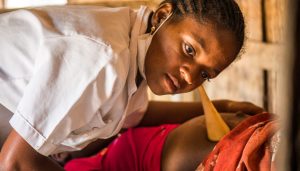Latest news
New Drug Combo Tackles Malaria in HIV+ Mums
January 31, 2024
Science journalist Dann Okoth of LIDC member insitution SciDevNet recently reported on research conducted by a collaborative team from the Liverpool School of Tropical Medicine, Kenya Medical Research Institute, Kamuzu University of Health Sciences, and Malawi University of Science and Technology. Their study introduces a new combination of medications aimed at combating resistance to common malaria drugs, particularly among pregnant women with HIV in sub-Saharan Africa. Crucially, this combination is deemed safe and well-tolerated by pregnant women, a crucial factor in preventive treatments. We are delighted to share news of this advance here.
The World Health Organisation (WHO) estimates that approximately one million HIV-positive pregnant women in sub-Saharan Africa also suffer from malaria annually, posing significant health risks to both mothers and newborns. Existing malaria drugs are facing challenges due to increasing resistance among malaria parasites.
The study’s lead author, Hellen Barsosio, highlights the importance of their findings, emphasising that the new drug combination—monthly dihydroartemisinin–piperaquine plus daily co-trimoxazole—significantly reduces the risk of malaria in pregnancy by 68%.
Researchers have found that a monthly course of the antimalarial combination drug dihydroartemisinin–piperaquine added to a daily regimen of the antibiotic co-trimoxazole reduces the risk of malaria in pregnancy by 68 per cent.
Barsosio underscores the need for policy changes based on these encouraging findings, which could greatly enhance maternal and newborn health across Africa. The study addresses concerns raised by the WHO regarding alternative medicines for preventing malaria in pregnant women with HIV due to drug resistance.
Simon Kariuki, Chief Research Officer at the Kenya Medical Research Institute, notes the significance of the study’s applicability beyond high malaria transmission areas to regions experiencing resistance to drugs like co-trimoxazole and Fansidar.
Joachim Osur, Vice-Chancellor at Amref International University in Nairobi, welcomes the study’s outcomes, emphasising the importance of additional options in combating both malaria and HIV on the continent. He stresses the need to incorporate these findings into medical treatment guidelines while maintaining other malaria prevention and treatment strategies.
In summary, this research offers a promising avenue for addressing the dual burden of malaria and HIV among pregnant women in sub-Saharan Africa, underscoring the importance of continued innovation and adaptation in public health interventions.
Photo Credits:
A midwife conducting antenatal care. Researchers have unveiled a new drug combination that cuts malaria risk in pregnant HIV-positive women. Copyright: Rawpixel, (CC0 1.0 DEED)
A young woman being attended to by a nurse at a health clinic in Sierra Leone. Copyright: Rawpixel, (CC0 1.0 DEED).

